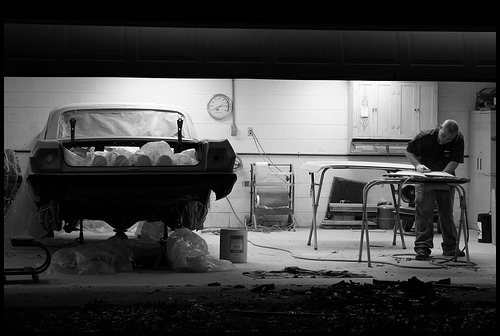
Due to the high expectations placed on car paint---a lustrous shine, an ability to stand up to extreme weather, etc.---it is some of the most sophisticated paint you can buy. The downside is that when the paint does chip, it's not always easy or cheap to have it fixed. Here are a few tips on saving your car's finish---and therefore your money.
Weather is a huge factor in a car's paint's health, no matter the climate. Extreme heat and sunlight can severely damage paint. The paint will begin to lose shine, form bubbles and lose strength. If your paint job is very delicate, or your car is regularly exposed to extreme heat conditions such as sitting in a parking lot for eight hours a day, consider using a protective car cover. Weakened paint due to sunlight is more likely to chip, and even minor scuffs could cause the paint to chip if it is weak enough.
Colder climates are where the weather really affects a paint job. Wind, ice, snow and---more than anything---road salt cause paint to weaken. Cold weather can weaken enamel, ruin the wax and expose paint to the horrors of winter weather.
Salt is the true killer of the bunch. Wheels can kick up chunks of salt and cause damage to a car's finish. But much worse than causing simple paint scuffs, salt is a catalyst for rust. This is why so many rust spots occur around wheel arches, since that is where salt is most likely to hit.

Road hazards come in many forms, and the dangers they pose to your vehicle's paint are generally obvious. Trucks carrying gravel, salt, sand, wood and dirt pose a hazard to the cars around them. Even the tiniest particles, especially those that go flying at highway speeds, can chip or severely scratch paint. Adhere to the warnings attached to the backs of many of these trucks and keep your distance.

Two places to avoid driving to protect your paint job are anywhere off-road and anywhere there may be loose debris.
Every element of off-roading---mud, tree branches, stones and dirt---can cause severe paint chipping and rust.
Rough road surfaces or roads covered in debris are the more common cause of paint chipping. Spilled sand, stones or anything else which may be in the path of your car should be safely avoided. Not only will the debris cause your paint to chip, but if it is slippery enough, it could cause you to crash.

Repairing chipped paint is often a simple task of buffing it out or fixing it with some rubbing compound. However, if a scratch is big or the problem is ignored, it could require a new paint job. New paint jobs can cost thousands, depending on the kind of car and the paint that's required---so don't ignore a scratch just because it's small.
On top of the that, rust caused by paint chipping can deteriorate your body panels altogether. Paint chipping can turn into a big problem, and every chip should be treated as such.

Believe it or not, washing a car isn't always necessarily good for the paint. If done correctly, it can help protect paint against chipping. But performed excessively or incorrectly, washing a car can illuminate rust spots and damage the paint job.
Use microfiber towels and washcloths when cleaning your vehicle. Make sure to use soap designed for cars, not dish soap. Dish soap damages waxes and enamels and will weaken a car's paint. Wax every three months or so, especially at the beginning of winter, to help protect the paint from chipping during harsh weather conditions.
